BW music therapy students are finding their niche - pursuing their passions and the pathways to achieve them thanks to new faculty and initiatives that are infusing fresh energy into the program.
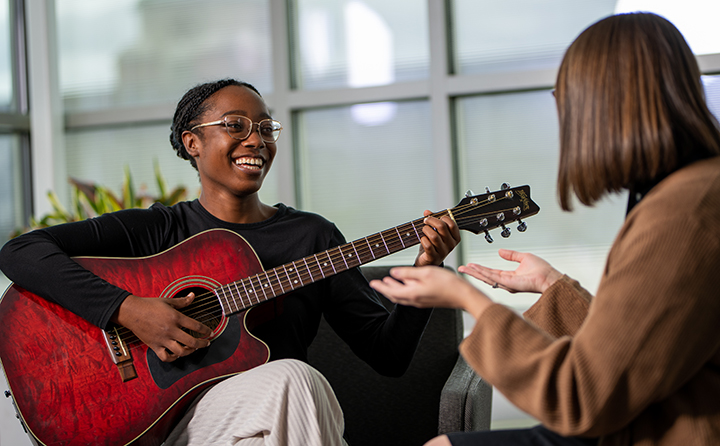
One year into her appointment as director of the Cleveland Music Consortium (which is housed at BW), Kara Caine, MME, MT-BC, is looking to broaden the reach and impact of the program in Northeast Ohio and to expand student opportunities. Among her goals are developing undergraduate research opportunities with other BW departments, boosting on-campus client therapeutic services, exploring new practicum and internship sites, and creating partnerships with community organizations.
Working with her to achieve the goals are newly added faculty members Dr. Lisa Gallagher, MT-BC, founder of the music therapy program and research program manager for the arts and medicine department at Cleveland Clinic, and Alicia Hrubey, MM, MT-BC, founder and executive director of In Harmony Therapeutic Services, an organization that uses the arts combined with trauma-informed supports to help children.
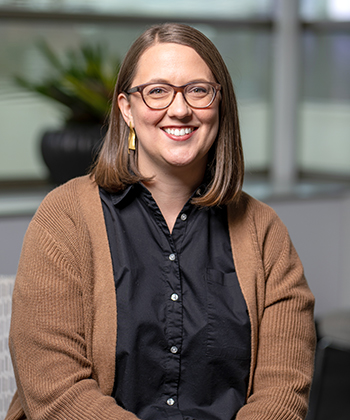
For students, the personal and professional rewards of a career in music therapy make it a popular major that enables them to meld their love of music with providing compassionate, skilled therapeutic services to clients across diverse settings - medical centers, schools, nursing homes, mental health centers, out- and in-patient clinics, and more.
From heartfelt moments of client connections that evoke emotion and empathy to transformative experiences that offer introspective insights into their own personal goals within this rewarding career field, BW music therapy students are creating a compelling narrative that gives individuals a voice through music.
"I have been a violinist since I was three years old," noted Jessica Stearns, a 30-something post-baccalaureate student in BW's music therapy equivalency program.
"My grandparents started me with the Suzuki method to give me a skill I could enjoy my whole life, as well as to teach me responsibility and discipline. They never anticipated it would become my career path."
The Uniontown, Ohio, resident spent countless hours perfecting her skill as a performance major in college. Over the years, Stearns performed with symphony orchestras and other groups in the area. Three years ago, her career trajectory took a turn when she volunteered at a residential facility offering assisted living/memory care.
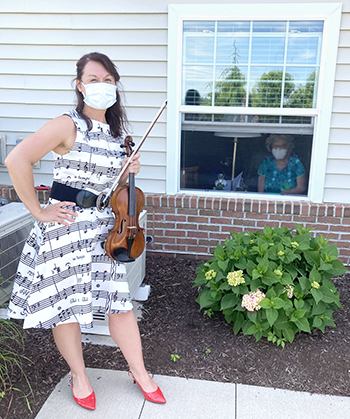
"I absolutely fell in love with the residents. I saw how music had the power to connect people with pieces of themselves that had been lost or forgotten. One day, a resident in a wheelchair, who was not always oriented to the space and time he was in, asked me to play "The Blue Danube Waltz." His wife lived at the facility with him. When I began performing, he straightened up in his chair, raised his wife's hand high in the air and began to sway. His eyes lit up with the reminiscence of the notes he was hearing," she recalled tenderly.
"It was a beautiful moment I will never forget. He and his wife had been ballroom dancers, and that song was one of their favorites. I knew then I wanted to have more of those beautiful moments," she explained.
"As part of my music therapy studies, I did a practicum with Rahab, an organization that works with victims of human trafficking. I am very passionate about this particular demographic for deeply personal reasons," she remarked thoughtfully.
"I use my violin in sessions as a part of relaxation and reminiscence interventions. There is something about the violin that captures people's attention and holds them in the moment. I can't really explain it other than it may have something to do with the violin imitating the human voice," said Stearns.
"My goals in music therapy include creating a space where multiple modalities of therapy are offered. My fiancé is a social worker and a therapist, so we are planning on building a program together that includes music therapy, traditional talk therapy, drama therapy, as well as incorporating physical activity, such as wellness running groups. We are so excited to be on this journey together in helping others," she emphasized.
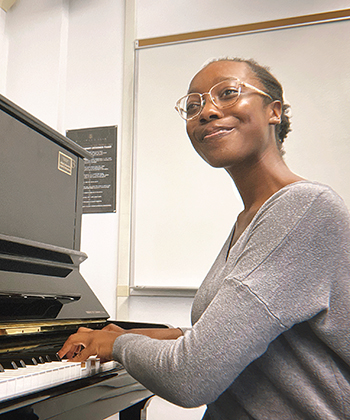
"I was initially drawn to the field of music therapy after reading 'Musicophilia' by Oliver Sacks in middle school. It is incredibly fulfilling to know I can assist clients in their growth, connect to my different areas of interest and engage with a variety of people, instruments and genres of music," remarked Payton Cole, a music therapy and French Horn performance senior from Lansing, Michigan.
"As part of my practicum course last semester, I assisted with BW's Way with Words, a group for adult stroke survivors with aphasia. I was the first student music therapist to collaborate with BW's communication sciences and disorders department for this initiative. Because music, especially singing, can stimulate different areas of the brain than standard speech, it was wonderful to see the favorable impact music had on the group members," said Cole.
"Lately, I have been deeply interested in grief, and I would one day love to start a music therapy program to help grieving individuals. I also am passionate about culture-centered music therapy, which aligns therapy with the cultural backgrounds of the individuals and communities being served," she noted.
"Musical preferences and musical customs vary greatly amongst different communities. In music therapy, it is important to recognize the backgrounds of different people and communities to positively impact them. This is especially important when clients may be disregarded often and have difficulty feeling recognized or understood. I hope to increase the accessibility of therapeutic music services for individuals in various communities who face economic and societal constraints as a way to address the wide disparity that exists in who gets to interact with music and have their cultures uplifted and appreciated," she explained.
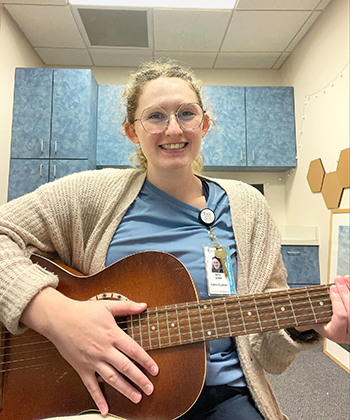
"Music therapy is a great way to channel my talents for the greater good of people. I'm inspired by each of the patients I've ever worked with as well as my peers who bring flexibility, adaptability, creativity, musicianship, calmness, kindness and so much more to their profession," stated Emily Szillat '22.
"I always had an interest in working in a medical setting. I want to positively impact individuals and families, in a beautiful way, through a shared connection with music," noted the Massillon, Ohio, resident who is in the final semester of the program and working as an intern at the Medical University of South Carolina.
"I chose to apply for this music therapy internship in Charleston because I really wanted a medical setting, as that is where I'd love to work one day. Medical internships are among the most competitive," explained Szillat.
"I have a few big career dreams for my future," she asserted. "I would love to obtain my NICU-MT Certificate, which is specialized training required for working in the neonatal intensive care unit (NICU). As a baby, I spent the first days of my life in the NICU and have heard countless stories from my parents about what a troubling and difficult time it was for them and for me."
Szillat went on to say that she is also interested in eventually earning a Ph.D. in music therapy so that she can contribute to the field both as a researcher and a professor.
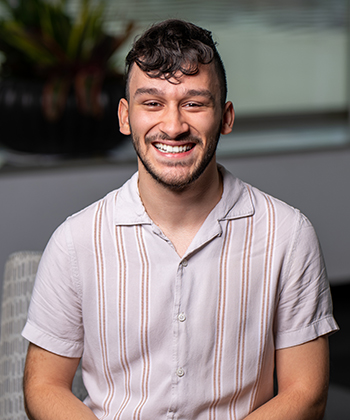
"I grew up immersed in music - with it outlining milestones of my childhood and fostering a passion to be outwardly expressive and the means through which I could connect with others," described Adrian Scoccia '23 of Buffalo, New York.
"In the spring, I led group and individual music therapy interventions with in-patient psychiatric patients at Summa Health System in Akron. The fast-paced environment helped to boost my confidence and efficiency as a clinician and student music therapist. Helping individuals understand and cope with their own mental health is something very important to me," he recalled.
"My long-term goal consists of specializing in neurologic music therapy and working in rehabilitative medical settings to provide music therapy services to individuals who have experienced traumatic brain injuries or related incidents," said Scoccia.
"Being Puerto Rican, I hope to one day provide music therapy to both English- and Spanish-speaking clients and improve accessibility to mental health services to Spanish-speaking communities. Although music therapy is a rapidly expanding healthcare service within the United States, it is immensely underrepresented within Spanish-speaking communities," he explained.
"BW's music therapy program is rigorous and highly effective in training skilled clinicians who go on to complete internships across the U.S. I can confidently say that the coursework and overall program, alongside the support of the extraordinary music therapy professors, has supported my growth and passion for this fulfilling career field," he concluded.